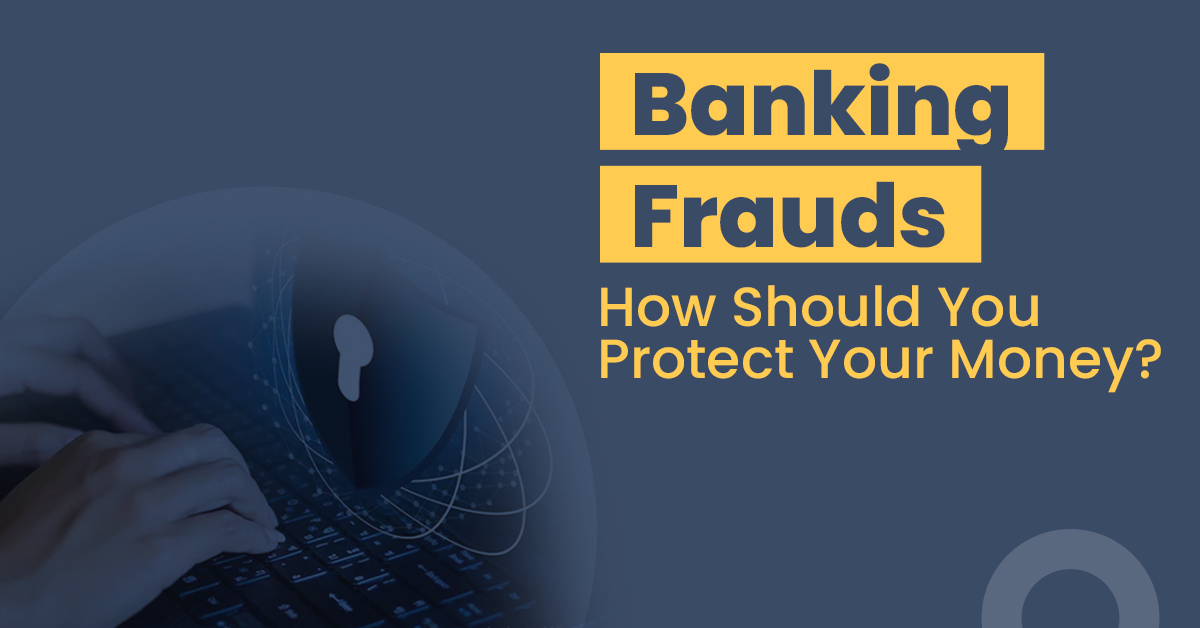Banking Frauds: How Should You Protect Your Money?


Nowadays, everybody is aware of the digital mode of payments, which makes our lives easier. During the COVID-19 situation, the us of digital transactions increased rapidly. However, like a coin has two sides, digitalisation has its pros and cons because it has made financial transaction easier and faster, and on the other hand, it also paved the way for fraudsters and scammers to make use of the gap and cheat the customers in various ways.
What is Bank Fraud?
Bank fraud can be defined as an unethical and/or criminal act by an individual or organisation to illegally attempt to possess or receive money kept with a bank or financial institution.
Types of Bank Frauds
1. Phishing
Phishing is a kind of practice in which fraudsters communicate through the creation of a website that is very similar to a legitimate website, such as a bank’s website, e-commerce website, search engines, and so on, and they distribute these links through emails, SMS, social media, and other methods.
People just click the link without checking the URL and the fraudster’s main aim is to steal sensitive data like card details, passwords, and login credentials. By using this information, they dupe the people and steal their hard-earned money.
2. Vishing
Vishing is a kind of phishing method where the fraudsters use calls and/or social media systems to dupe the consumer into believing that they are a bank’s representative or any other financial institution’s representative and then discloses their information like their DOB, their name, etc to win their trust and then obtain their confidential information like OTPs, card details, and CVV.
3. Skimming
Skimming is a kind of fraudulent activity where fraudsters illegally install devices in ATMs and Point of Sale (POS) terminals, and by doing this, they obtain the ATM pin and create a clone card to steal the money.
Sometimes they pretend to be customers and stand in the queue, and when the customer enters the PIN, they gain information, create duplicate cards, and steal their money.
4. SIM Swap or SIM Cloning
SIM Swap or SIM Cloning is a type of fraudulent activity wherein the fraudster gets access to the physical SIM of a consumer and uses a smart card copying software to create a replica of the original one and also gain the personal and confidential information of the consumer to steal the money by getting the details like OTPs.
5. Fraud Through QR Code
Nowadays, this is the most common type of online fraud prevailing in the market. Here, fraudsters send any QR (Quick Response) code to the consumer’s mobile number and tell them to scan those. By scanning such QR codes, customers may unknowingly authorise the fraudsters to withdraw money from their account.
6. Impersonation on social media
Social media impersonation is digital identity theft where fraudsters create a duplicate profile by using the image, name, and other identifying elements of a person, company, or organisation and requesting money from their friends and other connected users on the platform under the false pretext of a medical emergency etc. They also gain the trust of the users over time, and when users share their personal/private information, they resort to blackmail to extort money.
7. Frauds using online sales platforms
On online marketplaces, scammers act as buyers and indicate a desire to buy the seller’s goods. To win people’s trust, they claim to be living in distant locations. They use the “request money” option in the UPI app in place of paying the seller and demand that the seller confirm the request by entering the UPI PIN. As soon as the seller enters the PIN, money is transferred to the fraudster’s account.
Ways to protect your money from the Banking frauds
In the above paragraph, we have learned about the various types of frauds, now let’s take a look at the measures for how to save your hard-earned money from these frauds:
- Keep changing your passwords frequently: To protect yourself from these frauds, update your passwords every two-three months and create a strong password that includes special characters and numbers.
- Avoid using public computers for Net Banking: One should never use a public computer for online transactions as hackers can gain access to your bank details and you can be on the verge of losing your hard-earned money.
- Use only verified apps and websites for online transactions: To avoid any online monetary transaction fraud use only legitimate websites and apps. Online banking fraud can occur if a user uses unapproved websites or applications.
- Make your computer secure: Due to the increase in the number of cases of cyber crimes, one can secure their computer by installing anti-virus software which should be updated and enabled on your computer on a regular basis so that it could identify the threats and malicious activities and can save your confidential information from theft.
- Be mindful while using your Debit/Credit card: Do not share your card details with anyone like the card number, CVV, etc. If you lose your card, report it immediately to your bank so that they can block your card and further transactions can be stopped.
- Never share your OTP or bank details over the phone call: Remember a bank never asks for details like OTP, PIN, Password, or your account number over the phone call. If you receive any such call then disconnect it and report it to your bank.
Final word
In today’s fast moving world, digitalization has made our lives easier as we don’t have to be in queues for long hours in banks for completing simple banking transactions, thanks to technological advancement. As digital banking has made banking very convenient for us, however, it has also increased the risk of online banking fraud significantly. Consumers must be aware of these malpractices and save their money.
FAQ
What are the types of Banking fraud?
There are various types of banking fraud like phishing, vishing, skimming, SIM swap, etc
Is it safe to share my login information with third parties?
No, you should never share your login credentials with anyone because anyone can misuse your information and can dupe you.
Should you share your Banking details over the phone?
No, you should never share your banking details over the phone call as banks never ask for any of your information over the phone call.
How to secure your computer from online fraud?
You must install an antivirus on your computer and it should be updated and enabled on a regular basis so that it could identify threats and can save your money from theft.




